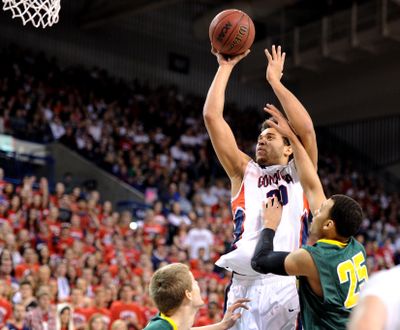Blanchette: With finish in sight, Harris has floored it

Music and art appreciation long ago passed into the Gut Course Hall of Fame, and hereabouts, of course, there is Zag Appreciation.
Not the day-to-day adoration and obsession of all things Gonzaga basketball, which can all be a little much. But the point in the senior year of nearly every Bulldog A-lister when his place in the big picture is fixed and he can be appraised for what he is and not for what was imagined for him, and it can be done outside the din and drama of March.
This was just such a weekend for Elias Harris.
Ninety percent of his Gonzaga career is complete with the 66-52 dispatching of San Francisco on Saturday evening. The last 10 percent should be a gift.
For the statistically inclined, some weekend arithmetic:
Five-of-17 shooting. Fourteen points. Eleven rebounds. Seven turnovers.
Doesn’t much sound like the resume of an all-league player, does it?
Well, it isn’t. It’s what two all-league players mustered together in their encounters against Harris, who seemed to have the dial cranked up to 10 all weekend. In the meantime, he posted his first back-to-back double-doubles of the season, setting a tone that was positively relentless for the Zags in the first halves of wins over both the Dons and Brigham Young.
“When he’s forceful,” said coach Mark Few, “we’re good.”
Top 10 good.
The Zags didn’t sustain that all the way through either victory, but the inevitable caveat about the difficulty of riding the accelerator after routing a team for 20 minutes seems to apply.
But there was nothing wrong with Harris’ go-pedal.
“I’m just trying to gather my energy for the last few games,” he said. “I don’t have that many left.”
A dozen, maybe several more depending on how March treats the Bulldogs. By the time it’s over, barring the unforeseen, he’ll be in the ballpark of 1,900 career points and 950 rebounds, and no Zag has ever reached both milestones. He’ll stand third on the school’s list in the first department, and second in the other. He’ll be a three-time all-conference player, have started more games than any Bulldog and if things go especially right, be the winningest one of all.
And yet his legacy with this team is just how evenly the Bulldogs evolve night to night with virtually no individual agendas.
“Everybody,” he said, “is there for each other.”
Take his work the past two games, first against BYU’s Brandon Davies and then USF’s Cole Dickerson. Defense, Harris stressed, is particularly a team concept, but those two were his assignments – and Davies was all but invisible the first half as the Cougars fell behind by 19 points, and Dickerson didn’t score the entire game.
“He did as good a job on Davies as you could,” said Gonzaga assistant coach Ray Giacoletti, “and he did exactly what we asked: deny him to 15 feet, and then you’ll have some help when he has to bounce it. But if he catches it in the paint, it’s on you.”
Dickerson, who was averaging a double-double coming into the game, doesn’t bring Davies’ size, but more skill. Help came from Kelly Olynyk on the switches, but there were plenty of times Harris simply denied Dickerson the ball: The USF star got off just four shots.
“A lot of people, they’re not sure if I can guard,” Harris said, “and maybe I wasn’t a good defender my first couple of years. But I believe I can guard.
“I try not to hear a lot of that stuff anyway. But I do like to prove people wrong.”
The many-layered Bulldogs have thrived this year even when one or more of their standouts has struggled, and there’s surely no diminishing the impact of Olynyk’s emergence and steadiness. But it’s just as obviously clear that they’re at their best when Harris is at his. Demonstrative he’s not, but few Zag big men have approached his ferocity – when he’s been engaged.
“It sounds like an easy concept,” said Few, “but sometimes in the past he could lose sight of the effort and game-plan stuff. But he’s been really dialed in. He’s playing like an athlete, and that’s how he needs to play.
“I don’t think there’s any denying how much him playing that way means for us.”
For Giacoletti, the tipoff comes well before, well, tipoff.
“You can tell in walk-throughs (on game day) if a guy’s really engaged,” he said, “and you see it with him now. He’s the one talking and giving directions. In years past, it’s a coach asking, ‘What are you doing in this situation?’ Now he’s the one talking, trying to help others through it.”
It’s a quality to appreciate, and the right time to do just that.